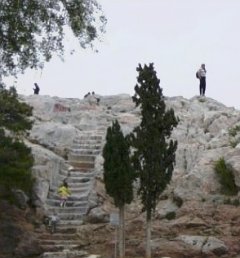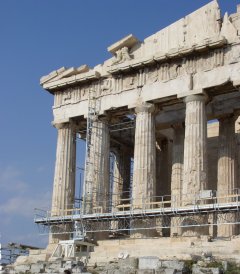This Article: (9 Pages)
- 1. John in the gospels
- 2. John's links to the Judean ruling... elite
- 3. The standard of learning in the... years C.E.
- 4. The beauty of John's letters
- 5. John, son of David and Aaron
- 6. John's letters
- 7. John's great issue – his... letters & The Great Lie
- 8. John himself
- 9. John's summary: The word made flesh
3) The standard of learning in the years C.E.
The educated and 'uneducated'

But what was the standard of 'private people', of the general public of this time? What might the difference be between the merely educated and the nit-picking Torah scholars and their academic doctors? The modern world has a habit of thinking knowledge has progressed. But progress has been very uneven, and there is evidence of significant loss of knowledge. It was prophesied in Daniel,
But thou, O Daniel, shut up the words, and seal the book, even to the time of the end: many shall run to and fro, and knowledge shall be increased. (Daniel 12:4)
Daniel is speaking of only our time since mid 1800's, before that there had not been a huge growth in knowledge since the heights of knowledge that were achieved in the classical world. At the time of the going forth of the Gospel in the years Anno Domini the world was at the height of the power and stability of the Roman Empire, and even the meanest citizen might have been able to read and write 2 languages, and the leaders of high scholarship were renowned for an unmatched standard of excellence, many of them valued and quoted even today. It is to be noted that even while not known as a teacher Jesus was called to read at the Synagogue. It seems all men could read the scriptures, and in fact even today, turning twelve in Judaism means a boy is first called up to read, and they are regularly expected to read the scriptures in Hebrew from the bimah (platform) after that.
Even at 12 years old Jesus stunned the teachers (doctors of the Law) in Jerusalem with his knowledge – and these teachers might have included the great Hillel himself. Hillel the Elder (~110 BCE-10 AD), is deemed the greatest sage of the Second Temple period, and is still quoted. The Talmud, lists seven leaders of Hillel's school of thought including Gamaliel who we know from the scriptures. These were given the title Rabban/Rabbi (master/doctor), a title also given to the leader of the Sanhedrin. This was the era of great schools, and scholarship, as not only is the school of Hillel famous, so was that of Shammai (50BC–30AD) who was a scholar who was an important figure in Judaism's core work of rabbinic literature, the Mishnah, and still highly regarded. Even these men, or those led by them, valued the greatness of thought of Jesus, and could not answer it!
Now about the midst of the feast Jesus went up into the temple, and taught. And the Jews marvelled, saying, How knows this man letters (detailed study of the Torah/ Scriptures), having never learned? Jesus answered them, and said, “My doctrine is not mine, but his that sent me.” (John 7:14-16)
Jesus' teaching was far and beyond superior to the best the world has seen, and he learned the Scriptures through knowing them and knowing the thinking of his Father. But note Jesus' answer- the reason why his doctrine, his teaching, was beyond others is that Jesus spoke the word of Yahweh, not his own learned musings. Jesus wasn't a great one in the midst of idiots, he was a great one in the midst of the great minds.
Jesus knew he was greater than Solomon.
And when the people were gathered thick together, he began to say, This is an evil generation: they seek a sign; and there shall no sign be given it, but the sign of Jonas the prophet. For as Jonas was a sign unto the Ninevites, so shall also the Son of man be to this generation. The queen of the south shall rise up in the judgment with the men of this generation, and condemn them: for she came from the utmost parts of the earth to hear the wisdom of Solomon; and, behold, a greater than Solomon is here. (Luke 11:29-31)
He is not modest, he doesn't have to be. He speaks truth and fact. It is a fact we can know also. The greatest minds who have ever lived, at any time, have been given pause by Jesus' words and thoughts. And John learnt from him, stuck close by him and took notes, and more than that absorbed Jesus' knowledge. We are told this directly in the gospel records, After sending away the crowds Jesus goes into a house and teaches his disciples only, He calls them scribes
Jesus saith unto them, “Have you understood all these things?”
They say unto him, “Yea, Lord.”
Then said he unto them, “Therefore every scribe which is instructed unto the kingdom of heaven is like unto a man that is an householder, which brings forth out of his treasure things new and old.” (Matthew 13:51-52)
Learning in the Empire CE
Not only is this a great era in Jewish thought (a high point before the destruction that would come from 66-73AD), it was a great era in learning and a culture of writing of popular plays and poetry in the Greco-Roman Empire, which only comes with a well educated population. Some of these names are well known today
Varro (116-27BC) Nepos (110-24), Cicero (106-43BC), Caesar (100-44BC), Lucretius (94-52BC), Hirtius (90-43BC), Catullus (87-54BC), Sallust (86-35BC), Vergil (70-19BC), Gallus (66-26), Horace (65-8BC), Augustus (63BC- 14AD) Livy (59BC- AD17), Tibullus (55-19), Ovid (43 BC- AD17), Seneca (4 BC-65AD), Phaedrus (14-54 AD), Pliny the Elder (23AD-79AD), Petronius (27AD-66AD), Persius (34AD-62AD), Quintilian (35AD-100AD) Lucan (39-65) Martial (40-104), Statius (45-96) Juvenal(47-130) Tacitus (56AD-120AD) Pliny the Younger (61-111) Suetonius (75-150) Aurelius (121-180) Apuleius (124-170) Gellius (130-170)
Livy is often quoted as he wrote a history of Rome, but he was also known as a popular writer of treatises. Vergil, Horace and Ovid were studied as part if a classical education in England the 1800's. They are poets and writers. The apostle Paul, who is from a Roman city, knows and refers to writers such as these. At Mars' hill Paul said,

“Ye men of Athens, I perceive that in all things ye are too superstitious. ...; God that made of one blood all nations....That they should seek the Lord, if haply they might feel after him, and find him, though he be not far from every one of us: For in him we live, and move, and have our being; as certain also of your own poets have said, For we are also his offspring. (Acts 17:22-28)
In the world Jesus and John lived in there was considerable practical knowledge from Pythagoras' theorems to the value of 'pi'. Most proofs for modern geometry were known from the time of Euclid (300BC) and they may have known a reasonably accurate measurement of the circumference of the earth (Eratosthenes 275-194BC). The world already knew the theory of the atom as we can prove from Peter and Paul's writings, as they both use the Greek word 'stoicheion' translated correctly as 'elements', and Paul correctly refutes wrong Greek philosophical theory,
But now, after that ye have known God, or rather are known of God, how turn ye again to the weak and beggarly elements, whereunto ye desire again to be in bondage? (Galations 4:9)

The single most influential book on architecture ever was already written by the Roman architect Vitruvius around the year 25BC. As Jesus was trained as a carpenter he might even have known of it. It was a collection of existing knowledge written in both Greek and Latin and in plentiful circulation, so that even by 800AD many copies were still in wide circulation. It reveals a not to be despised state of knowledge regarding city planning, surveying, building technology, solar building design, 3D drawing projection, heating, plumbing, the movement of the sun, mechanics, water powered mills, de-watering machines and even lead contamination (which the modern world had to learn again).
From the mid Second Century AD there is a decline in the numbers of general historians, scholars, poets and playwrights as the Roman Empire was in decline. Scholars now know that the common Greek used in the New Testament was used Empire wide, from one end of the known world to the other, in the same way English is used today. In addition the educated knew and used classical Greek, in the same way people know and use Shakespearean English.
Archaeologists have found Greek manuscripts of this first century era in Egypt, showing that all the empire spoke and wrote Greek. It is understood that Matthew (Levi) who was a tax collector could write ably both in Greek and Hebrew, and wrote his gospel, without translation, in both languages. Paul of Tarsus of course was proficient in Greek. It seems John (the unlearned and 'private' self-educated) could also write in Greek, and may have learned it as a child or teen. It is now well known that those in Galilee were more likely to know Greek, as they were more Hellenised. John by implication tells us, he knew enough to know Greek and Latin when he saw it,
And Pilate wrote a title, and put it on the cross. And the writing was, JESUS OF NAZARETH THE KING OF THE JEWS. This title then read many of the Jews: for the place where Jesus was crucified was nigh to the city: and it was written in Hebrew, and Greek, and Latin. (John 19:19-20)
John mentions in his gospel four times the translation of a word into Hebrew, and his is the only gospel that does so. In addition he often gives translations. Examples are,
When Pilate therefore heard that saying, he brought Jesus forth, and sat down in the judgment seat in a place that is called the Pavement, but in the Hebrew, Gabbatha. (John 19:13)
He first finds his own brother Simon, and said unto him, We have found the Messiah, which is, being interpreted, the Christ. (John 1:41)
And said unto him, Go, wash in the pool of Siloam, (which is by interpretation, Sent.) He went his way therefore, and washed, and came seeing. (John 9:7)
This shows John is aware of two names, both the Hebrew and the Greek, and when writing in Greek uses the Greek name. It reveals two things. Firstly that Jerusalem was bi-ligual, and secondly that John knew scholarly Hebrew, the language of Jewish learning.
There are many misconceptions of what Anti-Christ means due to mis-information, and sensationalism. It is not hard to confirm what the Bible actually says.

 Show All
Show All

